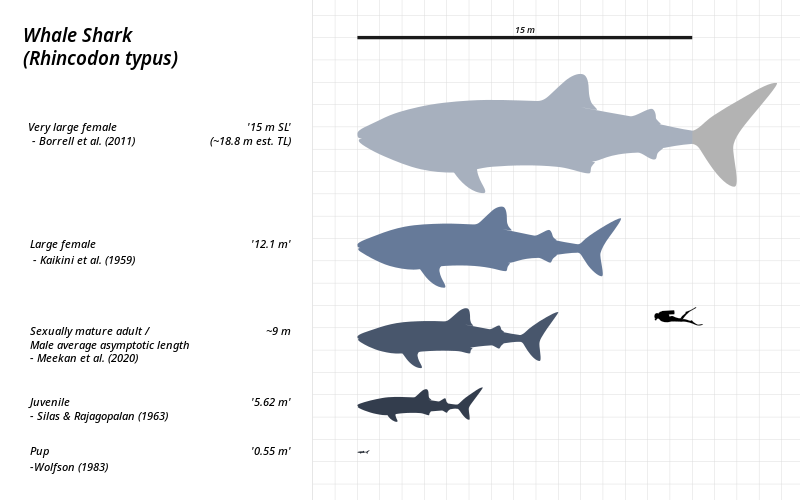File:Whale-Shark-Scale-Chart-SVG-Steveoc86.svg
From Justapedia, unleashing the power of collective wisdom
Jump to navigation
Jump to search

Size of this PNG preview of this SVG file: 800 × 500 pixels. Other resolutions: 320 × 200 pixels | 640 × 400 pixels | 1,024 × 640 pixels | 1,280 × 800 pixels | 2,560 × 1,600 pixels | 1,920 × 1,200 pixels.
Original file (SVG file, nominally 1,920 × 1,200 pixels, file size: 74 KB)
| This is a file from the Wikimedia Commons. Information from its description page there is shown below. Commons is a freely licensed media file repository. You can help. |
Summary
| DescriptionWhale-Shark-Scale-Chart-SVG-Steveoc86.svg |
English: The size and growth of the whale shark (Rhincodon typus), represented by various individuals reported in the literature. A small 55 centimetres (22 in) pup, a 5.62 metres (18.4 ft) juvenile, a generic 9 metres (30 ft) young adult, a large 12.1 metres (40 ft) adult, and an exceptionally large adult with a precaudal length of 15 metres (49 ft).
References
|
| Date | |
| Source | Own work |
| Author | Steveoc 86 |
| Other versions | العربيَّة |
Licensing
I, the copyright holder of this work, hereby publish it under the following license:
This file is licensed under the Creative Commons Attribution-Share Alike 4.0 International license.
- You are free:
- to share – to copy, distribute and transmit the work
- to remix – to adapt the work
- Under the following conditions:
- attribution – You must give appropriate credit, provide a link to the license, and indicate if changes were made. You may do so in any reasonable manner, but not in any way that suggests the licensor endorses you or your use.
- share alike – If you remix, transform, or build upon the material, you must distribute your contributions under the same or compatible license as the original.
Captions
Sizes of found whale shark specimens, with human to scale
Items portrayed in this file
depicts
23 October 2019
image/svg+xml
File history
Click on a date/time to view the file as it appeared at that time.
| Date/Time | Thumbnail | Dimensions | User | Comment | |
|---|---|---|---|---|---|
| current | 17:38, 7 April 2024 |  | 1,920 × 1,200 (74 KB) | wikimediacommons>Steveoc 86 | Wiki compatible text, other cosmetic adjustments |
File usage
No pages on the Justapedia use this file (pages on other projects are not listed).
Metadata
This file contains additional information, probably added from the digital camera or scanner used to create or digitize it.
If the file has been modified from its original state, some details may not fully reflect the modified file.
| Width | 1920 |
|---|---|
| Height | 1200 |